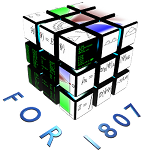DMRG and tensor networks in momentum space
Reinhard M. Noack, Eric Jeckelmann, Andreas Läuchli, Ulrich Schollwöck
Matrix-product-based numerical methods, in particular, the density-matrix renormalization group (DMRG), have been very successfully applied to treat interacting quantum lattice mod- els whose representation in real space is short-range and low dimensional. However, there are a number of significant advantages of working instead in a momentum-space or in a mixed real- and momentum-space representation. They include a smaller influence of dimensionality, better use of symmetries, i.e., translational invariance, the ability to treat longer-range interac- tions, and the prospect of applying additional well-controlled approximations. In this project, we will first develop and optimize DMRG methods for momentum-space and mixed real and momentum-space (e.g., real space along one coordinate axis and momentum space along the other) fermionic Hamiltonians such as the Hubbard model in one to three dimensions with the help of quantum information theory. Subsequently, we will implement and test further approxi- mations on the level of the state space and the representation of the Hamiltonian operator using quantum-information-based knowledge obtained in the first stage. Finally, we will implement, test, and optimize tensor-network-based generalizations of the momentum-space DMRG, starting with tree tensor networks.
